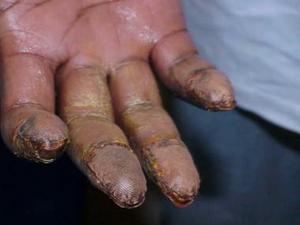BiometricsNew technology detects altered fingerprints
The widespread use of fingerprint recognition systems has led some individuals to disfigure or surgically change their fingerprints to mask their identities; new technology can help law enforcement and border control officials detect these altered fingerprints

Fingerprints surgically altered by skin grafting // Source: clpex.com
Michigan State University has licensed innovative software that detects altered fingerprints to Morpho, part of the Safran group, one of the world’s major suppliers of identification and detection solutions.
The widespread use of fingerprint recognition systems has led some individuals to disfigure or surgically change their fingerprints to mask their identities. The technology, developed by Anil Jain, University Distinguished Professor of computer science and engineering at MSU, can help law enforcement and border control officials detect these altered fingerprints.
“Government agencies worldwide encounter individuals who have gone to extreme measures to alter their fingerprints to avoid being identified by automatic fingerprint recognition systems,” Jain said. “The technology can raise a flag so that officials can then perform a secondary inspection to reveal the person’s true identity.”
A Michigan State University release reports that, previously, Morpho licensed tattoo-matching software developed by Jain. The technology uses features such as tattoo color, shape, and texture to compute the similarity between images.
“This transfer is the most recent development of our long and fruitful history of scientific collaboration with MSU,” said Jean-Christophe Fondeur, vice president of research and technology director of Morpho’s biometrics department. “We deeply appreciate Professor Jain’s commitment to the advancement of biometrics, and we are very happy to support his research.”
MSU Technologies, MSU’s technology transfer and commercialization office, facilitated the licensing of the software to Morpho.
“These software packages are just two of the many innovative technologies being developed by MSU’s faculty and researchers,” said Charles Hasemann, interim executive director of MSU Technologies. “MSU’s extensive intellectual property portfolio also includes inventions related to alternative energy, agriculture, medicine, engineering, and rare isotope research.”
Jain’s collaborators on the technology include Soweon Yoon, a computer science and engineering doctoral student at MSU, and Jianjiang Feng, a former postdoctoral fellow at MSU who is now at Tsinghua University.
— Read more in Soweon Yoon et al., “Altered Fingerprints: Analysis and Detection” (to appear in the IEEE Transactions on Pattern Analysis and Machine Intelligence, 2011)
